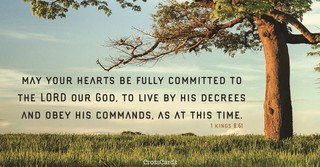
Change Translation
- Recent Translations
- All Translations
1 Kings 8:64
Share
Listen to 1 Kings 8:64
Settings
Scripture Text Size
64
That same day, the king set apart the central area of the Courtyard in front of God's Temple for sacred use and there sacrificed the Whole-Burnt-Offerings, Grain-Offerings, and fat from the Peace-Offerings - the bronze Altar was too small to handle all these offerings.
Images for 1 Kings 8:64

1 Kings 8:64 Meaning and Commentary
1 Kings 8:64
The same day did the king hallow the middle of the court that
was before the house of the Lord
The court of the priests that was before the holy place, adjoining to it, in which was the altar of burnt offering; this, or, however, the middle part of it, he sanctified for present use, to offer sacrifices on, for a reason hereafter given:
for there he offered burnt offerings and meat offerings, and the fat of
the peace offerings;
which was the reason why the middle of the great court was for this time set apart for this service.
Taken from John Gill's Exposition of the Bible
Unlock Deeper Insights: Get Over 20 Commentaries with Plus! Subscribe Now
1 Kings 8:64 In-Context
62
The king and all Israel with him then worshiped, offering sacrifices to God.
63
Solomon offered Peace-Offerings, sacrificing to God twenty-two thousand cattle, a hundred and twenty thousand sheep. This is how the king and all Israel dedicated The Temple of God.
64
That same day, the king set apart the central area of the Courtyard in front of God's Temple for sacred use and there sacrificed the Whole-Burnt-Offerings, Grain-Offerings, and fat from the Peace-Offerings - the bronze Altar was too small to handle all these offerings.
65
This is how Solomon kept the great autumn feast, and all Israel with him, people there all the way from the far northeast (the Entrance to Hamath) to the far southwest (the Brook of Egypt) - a huge congregation. They started out celebrating for seven days - and then did it another seven days! Two solid weeks of celebration!
66
Then he dismissed them. They blessed the king and went home, exuberant with heartfelt gratitude for all the good God had done for his servant David and for his people Israel.
Published by permission. Originally published by NavPress in English as THE MESSAGE: The Bible in Contemporary Language copyright 2002 by Eugene Peterson. All rights reserved.